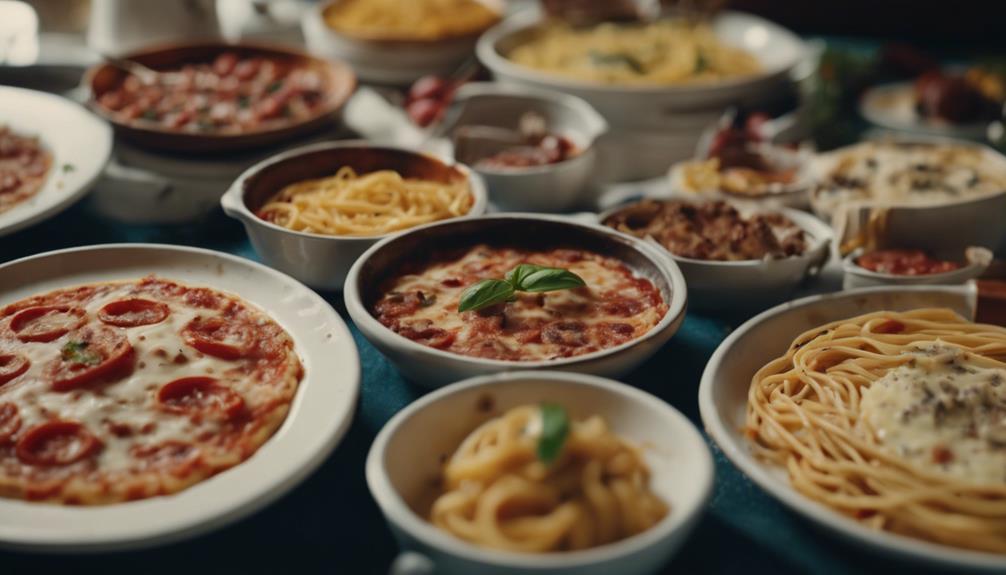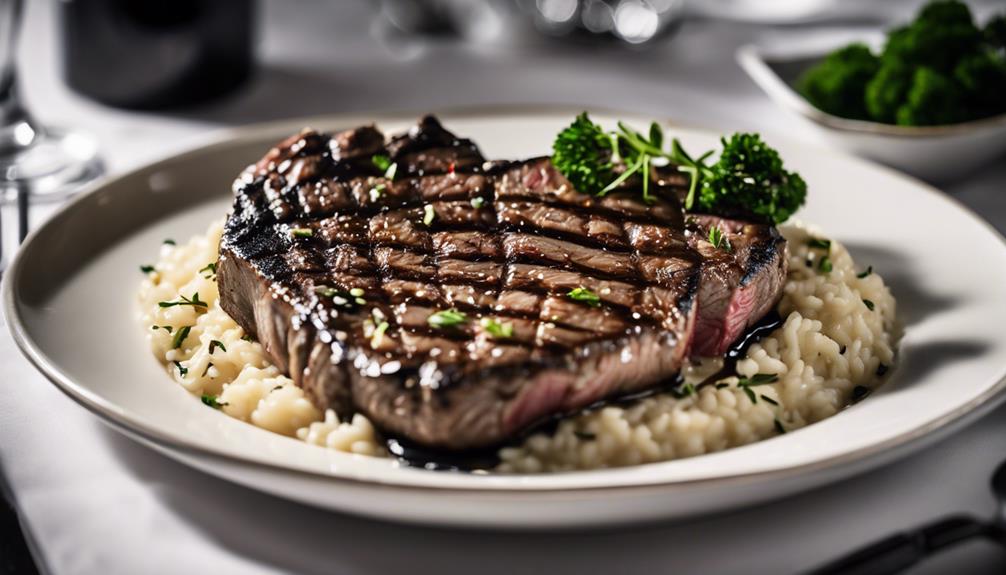Italian espresso isn’t just a drink; it’s a cultural symbol tied to the Slow Food movement. This vibrant tradition prioritizes quality, sustainability, and communal experience. When you sip an espresso, you connect with Italian heritage and a commitment to responsible sourcing. You’ll appreciate how coffee bars foster community and conversation. As your taste evolves, you might find that espresso embodies both tradition and modern ethical choices. Discover the deeper connections that espresso holds with Slow Food culture.
Key Takeaways
- Italian espresso embodies the Slow Food movement’s principles, emphasizing quality and sustainability in coffee production and consumption.
- illycaffè and similar organizations promote responsible sourcing, aligning with Slow Food’s advocacy for “Good, Clean, and Fair” coffee.
- The cultural significance of espresso in Italy fosters community engagement, reflecting Slow Food’s focus on local and traditional practices.
- Educational initiatives, like the University of Coffee, enhance consumer understanding of sustainable coffee sourcing and production methods.
- Espresso culture encourages appreciation for artisanal practices, merging traditional values with the contemporary emphasis on flavor and sustainability.
The Historical Significance of Espresso in Italian Culture

Espresso isn’t just a drink; it’s a cornerstone of Italian culture and identity. Emerging in Italy during the late 19th and early 20th centuries, espresso became a symbol of national pride.
By 2015, Italians consumed a staggering 14 billion espressos, representing 19% of all European coffee consumption. For about 70% of Italians, daily espresso is a ritual, mainly enjoyed in one of the 150,000 traditional coffee bars scattered across the country.
In 2015, Italians consumed 14 billion espressos, making it a cherished daily ritual in 150,000 coffee bars nationwide.
These coffee bars aren’t just places for a quick caffeine fix; they foster community engagement and relationships with local baristas. In addition, the strong, bitter flavor of espresso reflects not only a preference but also a deep-rooted cultural significance, making it an integral part of everyday life, similar to how intelligent tutoring systems are revolutionizing educational experiences by offering personalized learning.
Slow Food Principles and Coffee Quality
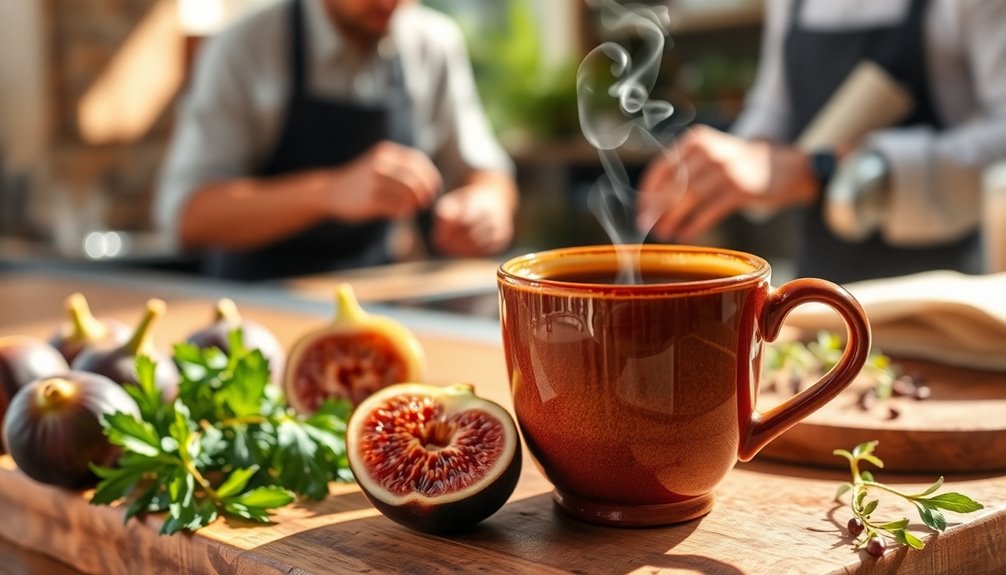
In Italy, coffee isn’t just a beverage; it’s a canvas for cultural expression and a reflection of values. The Slow Food movement champions principles of “Good, Clean, and Fair,” advocating for coffee quality that’s flavorful and ethically produced.
Brands like illycaffè embody this ethos by educating baristas and consumers about high-quality coffee. Their University of Coffee enhances knowledge of coffee origins and sustainable practices, deepening your appreciation of each cup.
As younger generations embrace specialty coffee, they align with the Slow Food philosophy, prioritizing transparency and sustainability. This growing awareness encourages you to reflect on the social and environmental impact of your coffee choices, reinforcing the connection between quality and responsible consumption in Italy’s vibrant coffee culture. Additionally, the principles of tax-efficient growth can also be applied to how consumers consider the financial implications of their purchases, including coffee investments.
The Social Experience of Coffee Consumption

While sipping your daily espresso, you’ll find that coffee in Italy is much more than just a drink; it’s a vibrant social experience.
Coffee in Italy transcends mere consumption; it’s a lively social ritual that brings people together.
Italian coffee culture thrives on connection, where 70% of Italians enjoy espresso daily, often standing at the bar, engaging in lively conversation. Coffee bars serve as communal spaces, fostering relationships between baristas and customers, emphasizing familiarity over brand loyalty.
Here are some key aspects of this experience:
- Quick espresso breaks promote relaxation.
- Strong, bitter espresso is preferred and affordable.
- Coffee consumption weaves into daily routines.
- Espresso represents 19% of European coffee consumption.
In Italy, every cup of coffee reflects a rich tapestry of social interaction and community spirit. Additionally, just like the creamy polenta that serves as a comforting side dish, espresso moments create a sense of warmth and comfort among friends and family.
The Role of Sustainability in Espresso Production
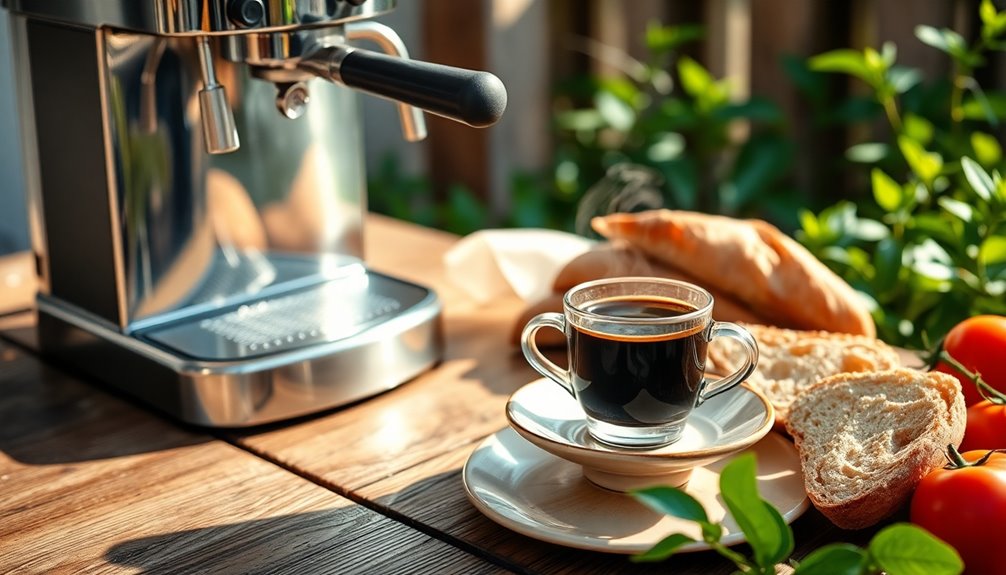
As you savor your espresso, consider the journey your coffee has taken to reach your cup.
Sustainability plays a vital role in espresso production today. Organizations like illycaffè champion responsible sourcing and environmental stewardship, ensuring that coffee production respects both the planet and its people.
The Slow Food Coffee Coalition works to unite stakeholders, promoting sustainable practices that enhance knowledge of coffee production methods.
Specialty coffee roasters are also shifting towards eco-friendly solutions, such as sustainable paper-based pods, reducing waste from traditional plastic capsules.
With younger generations prioritizing transparency and ethical sourcing, consumer awareness of sustainability is growing.
This shift is driving deeper appreciation for the stories behind your coffee, and its environmental impact, enriching your espresso experience. Furthermore, the emphasis on renewable energy technologies in coffee production facilities helps reduce their carbon footprint and supports sustainable practices.
Educating Consumers: The Path to Better Coffee

To truly appreciate coffee, you need to understand its quality and how it’s made.
Learning about sustainable practices and the importance of skilled baristas can transform your coffee experience.
As you explore these elements, you’ll become more connected to the rich culture behind every cup. Additionally, understanding the health benefits of coffee can enhance your appreciation for its role in your daily routine.
Understanding Coffee Quality
Understanding coffee quality is essential if you want to appreciate the nuances of your brew. The third wave coffee movement highlights the importance of flavor, sustainability, and responsible sourcing, contrasting with traditional Italian espresso.
By exploring specialty coffee shops, you can discover a world beyond the familiar strong brews.
Here are some key factors to contemplate:
- Origin: Where the coffee beans are grown affects their flavor.
- Processing: How beans are processed influences taste and aroma.
- Roasting: The roasting technique can enhance or mask flavors.
- Brewing method: The way you brew can bring out different qualities.
Organizations like illycaffè and the Slow Food Coffee Coalition are committed to educating consumers about these aspects, helping you make informed choices. Additionally, understanding customer sentiment can enhance your appreciation of coffee quality by guiding you towards the flavors that resonate with your personal taste preferences.
Barista Training Importance
While many people enjoy a good cup of espresso, few realize the skill and knowledge that go into crafting the perfect brew. Barista training is essential in Italy’s coffee culture, ensuring that 70% of Italians savor their espresso just right. Programs like those from Lavazza and illycaffè educate thousands annually, focusing on techniques that preserve authentic flavors. By mastering these skills, baristas play a significant role in enhancing consumer appreciation for quality. Additionally, trained baristas can recommend the best ground coffees for espresso machines, helping consumers achieve optimal taste at home.
| Training Benefits | Impact on Consumers |
|---|---|
| Preserves traditional flavors | Increases coffee quality awareness |
| Enhances preparation skills | Shifts taste preferences |
| Promotes sustainable practices | Fosters appreciation for craft |
In the coffee industry, well-trained baristas can truly elevate your coffee experience.
Sustainable Coffee Practices
As consumers become more aware of the impact their choices have on the environment and local communities, sustainable coffee practices are gaining traction in Italy.
The third wave coffee movement emphasizes quality and responsibility, educating you on the importance of sourcing coffee beans ethically.
Here are some ways you can support sustainable practices:
- Choose coffee roasters who prioritize fair trade and organic beans
- Explore local coffee shops that participate in sustainability initiatives
- Attend workshops at institutions like illycaffè’s university of coffee
- Support the Slow Food Coffee Coalition’s mission for “Good, Clean, Fair” coffee. Additionally, understanding investment diversification can help you support businesses that align with your values.
The Future of Espresso in the Context of Specialty Coffee
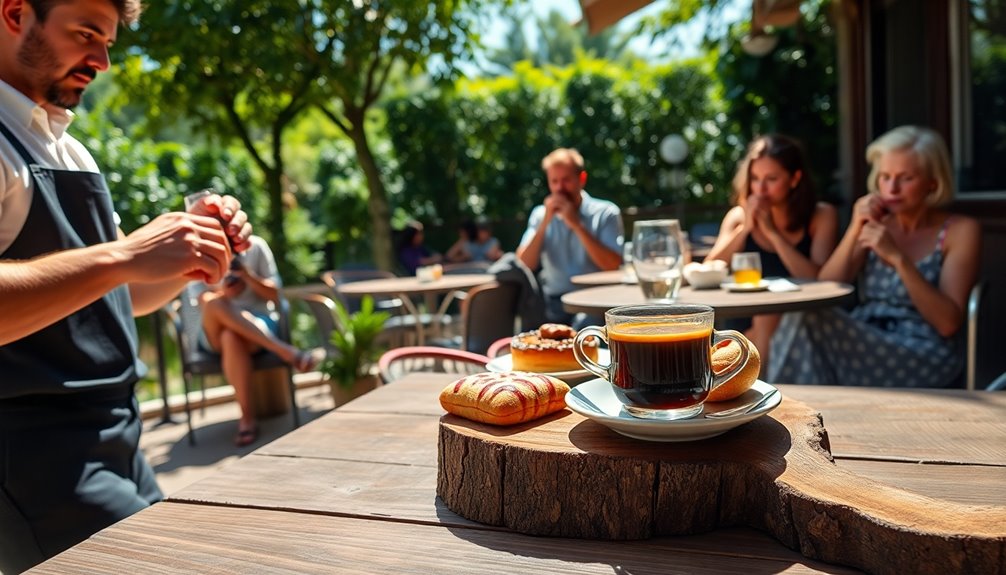
As you explore the future of espresso, you’ll notice how evolving consumer preferences are reshaping the landscape.
Specialty coffee innovations are introducing exciting flavors and methods that challenge traditional practices.
This shift invites a conversation about how Italy can preserve its espresso heritage while embracing new trends. Additionally, the influence of regional variations in coffee production can enhance the unique flavor profiles of espresso.
Evolving Consumer Preferences
With the rise of specialty coffee shops in Italy, consumers are increasingly exposed to a world beyond traditional espresso, sparking a shift in preferences.
Evolving consumer preferences are reshaping Italy’s global reputation for coffee, especially among young adults. You might notice:
- A growing interest in single-origin beans
- An emphasis on sustainability and ethical sourcing
- A curiosity for slow brewing methods
- Educational initiatives promoting quality and responsible consumption
Cities like Milan and Bologna are becoming hubs for these unique experiences, challenging the dominance of traditional espresso.
As brands like illycaffè and Lavazza educate consumers, you can expect a more nuanced appreciation for espresso’s preparation, blending tradition with innovation in your daily coffee ritual. This movement aligns with a broader trend towards sustainable sourcing, encouraging consumers to make more informed choices about their coffee.
Specialty Coffee Innovations
While traditional espresso remains a cornerstone of Italian coffee culture, specialty coffee innovations are reshaping the landscape, inviting you to explore new flavors and experiences. In cities like Milan and Bologna, cafés now showcase unique brewing methods and single-origin beans, marking a shift toward quality. Collaborations, like the one between Lavazza and chef Ferran Adrià, introduce groundbreaking products such as coffee caviar.
Here’s a glimpse of some exciting specialty coffee innovations:
| Brewing Method | Unique Creation | Flavor Profile |
|---|---|---|
| Pour Over | Coffee Caviar | Fruity and Fresh |
| Cold Brew | Solid Cappuccino | Creamy and Rich |
| Aeropress | Artisanal Espresso | Balanced and Smooth |
| Nitro Coffee | Sparkling Coffee | Crisp and Effervescent |
These innovations foster a new generation of coffee enthusiasts.
Preservation of Tradition
Although the rise of specialty coffee brings exciting innovations, the preservation of traditional espresso remains essential to Italian culture. With 70% of Italians enjoying espresso daily, it’s clear that this beloved drink is more than just coffee; it’s a symbol of identity.
While specialty coffee shops are increasing, the nearly 150,000 traditional coffee bars highlight a strong preference for time-honored practices.
Consider these aspects of preservation:
- Deeply rooted preferences for strong espresso
- Quick consumption at the bar
- Quality emphasis from brands like illycaffè and Lavazza
- Potential shifts in taste towards better coffee experiences
As consumer awareness grows, the future of espresso could evolve, blending tradition with the best of the specialty coffee movement.
Frequently Asked Questions
What Is the Italian Tradition of Espresso?
The Italian tradition of espresso centers around a quick, intense coffee experience.
You’ll find people standing at bars, savoring the strong, bitter flavor that defines this beloved beverage.
With around 150,000 coffee bars scattered across Italy, espresso isn’t just a drink; it’s a daily ritual.
You’ll appreciate the expertise of baristas who craft each cup with care, ensuring you enjoy the rich heritage behind every sip of this iconic Italian brew.
What Are the Cultural Influences on Italian Food?
When you explore Italian food culture, you’ll notice how regional influences shape the cuisine. Each area boasts its own ingredients and traditional recipes, creating unique flavors.
Family gatherings around multi-course meals highlight the importance of communal dining. You’ll appreciate the emphasis on simplicity and quality, where meals last for hours, allowing you to savor every bite.
This celebration of food fosters connections, making every meal a cherished experience.
What Is the Slow Food Movement in Italy?
The Slow Food movement in Italy, founded in 1986, emphasizes the importance of preserving local food traditions and sustainable practices.
You’ll discover that it champions the idea that food should be good, clean, and fair. By supporting seasonal and local ingredients, it encourages you to appreciate the cultural significance of traditional dishes.
Through this movement, you’ll find a growing awareness of food origins, leading to a richer dining experience rooted in community and sustainability.
Why Is Coffee Important to Italian Culture?
Imagine stepping into a bustling Italian café, the aroma of rich espresso enveloping you.
Coffee’s essential to Italian culture because it’s not just a drink; it’s a daily ritual. You’ll find locals gathering, sharing laughter over quick shots of espresso, creating lasting connections.
This vibrant social scene showcases Italy’s identity, reflecting regional preferences in every cup. With each sip, you’re tasting history, craftsmanship, and a deep-rooted passion for quality that defines Italian life.
Conclusion
In embracing the rich connection between Italian espresso and slow food culture, you’re savoring history, celebrating quality, and fostering community. You’re enjoying each sip, appreciating the craftsmanship, and supporting sustainable practices. By choosing better coffee, you’re not just quenching your thirst; you’re nurturing a movement that values taste, tradition, and togetherness. As you indulge in a cup of espresso, remember: you’re connecting with a deeper purpose, enriching your experience, and making a difference, one sip at a time.





